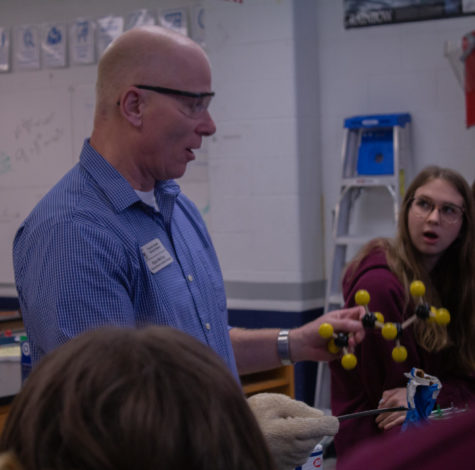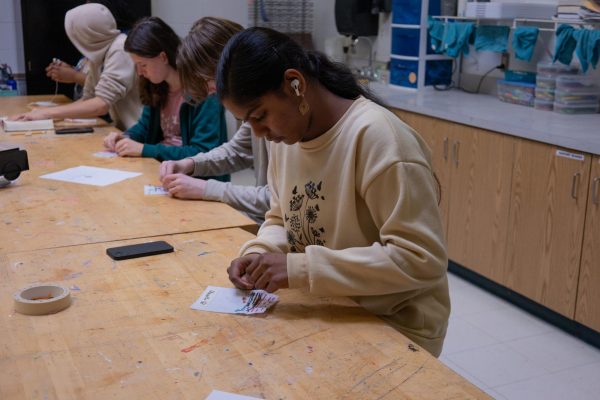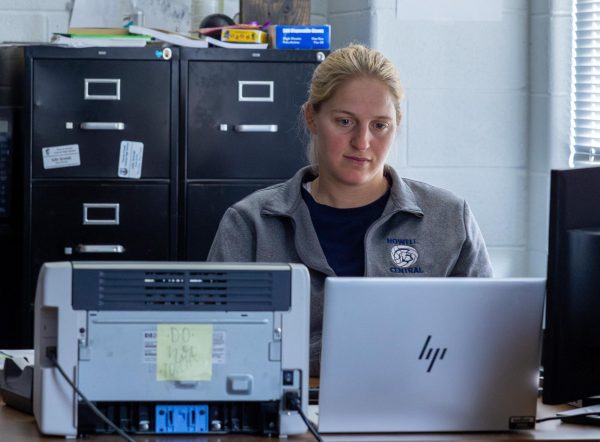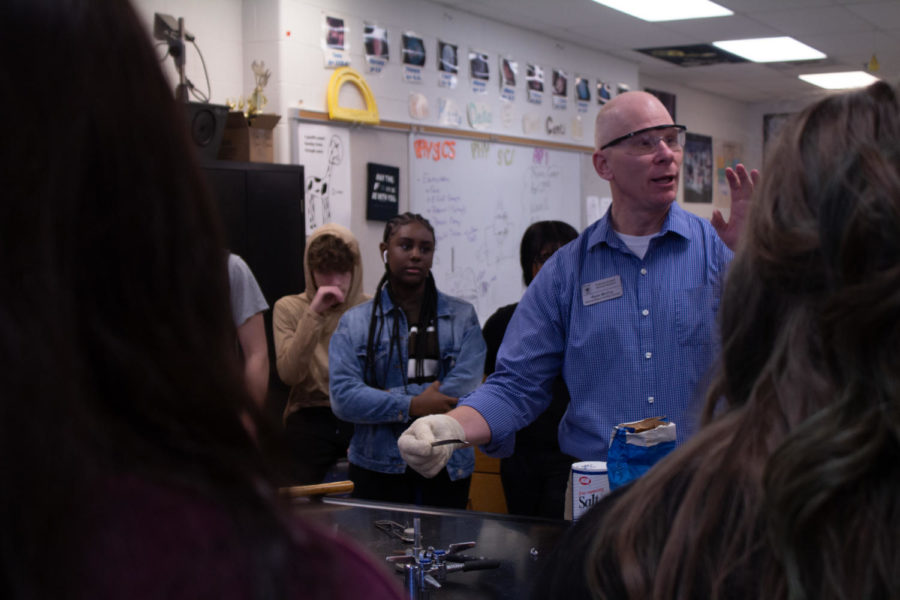Excitement within Enlightenment
Mr. McCoy demonstrating and explaining a chemical reaction while his students watch.
In classes where the academic material can be boring or overwhelming, sophomore Hannah Halterman has a much harder time staying fully engaged with her teacher. Furthermore, other students resort to using their desks as a pillow, and in AP classes where students pay for an exam or college credit hours, maintaining focus is essential.
Halterman said many teachers spice up their classes with jokes, allowing teachers to express their charisma and personality whilst helping students remember the material more effectively. Mrs. Jane Kelley, a social studies teacher who has been teaching for 11 years, gets “hip” with her students by incorporating cues in her presentations and videos related to pop culture and even for instance music from the 90s.
Halterman said friendships develop between classmates.
“There’s people that I might not know and we’re joking around, having fun, and we’re learning. [Mrs. Kelley] keeps everything like, ‘Oh, we’re joking around.’ It’s really good to make friends that way when you’re learning together,” Halterman said. “That clip from the office helps you remember and you have a visual for when you’re taking the test. It’s not just trying to memorize the date and the time.”
Mrs. Kelley also includes fun projects that help students review the material while being creative. Mrs. Kelley said teachers have a responsibility to engage their students because of their monetary investment.
“When I’m discussing the Mongols, we talk about how in modern day Mongolia they used falconry, specifically Eagles, and I put an eagle that goes across the screen with a screeching yelp, and that just always kind of gets people to laugh a little bit. It’s like a cheap laugh, but it’s fun,” Mrs. Kelley said. “I think if you can present the material in a way that is visually and mentally engaging, then your probability of success is going to increase.”
Mr. Ryan McCoy, who has been teaching various science classes for 27 years at FHC, mainly focuses on the conceptualization of concepts including the logic and reasoning behind each problem in Physics, especially in his AP classes. The algebraic part is usually left for the students’ math classes, but he will always answer questions. Mr. McCoy said being excited about the material will make students excited.

“Nothing great has ever been achieved without enthusiasm. If I’m not excited about it, why would my students be excited about it? The wonder is really the key like, ‘Why is this happening? What are the underpinnings of this phenomenon? I wouldn’t expect this to be the case, but it really is!” Mr. McCoy said. “What really made a big difference is how I was exploring the content with them. I just kind of look for those new ideas online so that way it keeps it fresh for me, I don’t want to do the same thing every year, I’ll get bored, and the kids will get bored.”
In Mrs. Kelley’s class, by providing occasionally very obscure information, sophomore Carter Berg said it provokes his mind into exploring what else had happened during that specific period. Additionally, when Mr. McCoy visually demonstrates a concept, Berg said class is more interesting and the learning environment is better.
“Those demonstrations in the classroom are more stimulating, so you look forward to going into class,” Berg said. “Applying your knowledge makes you feel more comfortable with what it is that you’re learning. Yesterday in physics, we were applying that thing with the toilet paper rolls to show how it is that they were falling, and the fact that we were able to do that just increases your confidence substantially in what it is that you’re doing, and it shows you know how to do this. It’s cool when you can see it happening.”
Mr. McCoy said he enjoys proving a concept to be true.
“When I see a phenomenon happening in real life, it’s exciting for me because I’ve never seen that done. No one’s ever shown me that before, but I know it should happen and when I show it to the students, it’s kind of neat and I act really excited, because I really am,” Mr. McCoy said.
Junior Everett Scott is an AP Government and Politics student of Mr. Nicholas Beckmann, and Everett described how avoiding bias is extremely important to not affect the content learning process, and Mr. Beckmann does a great job of this while keeping the class entertaining by telling stories.
“At first some people think that he’s scary, he’s tall and he’s got this face that looks like he’s serious, but at the end of the year, you’ll realize that he’s a soft little teddy bear inside and a really fun guy and he’ll make you feel included. That will make you want to participate more in class,” Scott said. “I feel like people who aren’t in his classes don’t really understand what it’s like to be in a Beckmann class. A Beckmann class is unlike any class I’ve ever been a part of.”
Your donation will support the student journalists of Francis Howell Central High School. Your contribution will allow us to purchase equipment and cover our annual website hosting costs. FHCToday.com and our subsequent publications are dedicated to the students by the students. We hope you consider donating to allow us to continue our mission of a connected and well-informed student body.





